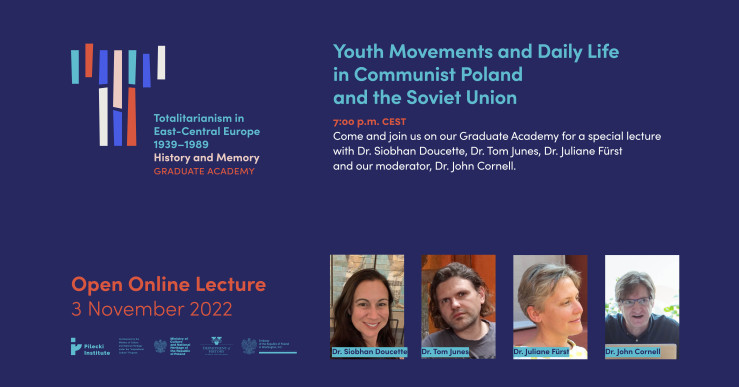Youth Movements and Daily Life in Communist Poland and the Soviet Union - Instytut Pileckiego
debata
03.11.2022 (CZW) 19.00
Youth Movements and Daily Life in Communist Poland and the Soviet Union
In this debate we will discuss the realities of everyday life in Communist Poland and the Soviet Union, particularly from the point of view of youth, underground culture, and culture at the margins of socialist society.

Our distinguished panelists have studied youth movements, underground publishing, and hippie subcultures, in Poland and in the USSR, topics which raise questions about how deep communist ideology and totalitarian control were really able to penetrate the societies of the Soviet Union and the Eastern Bloc.
Participants:
Dr. Siobhan Doucette is a historian of Poland. She is the author of Book Are Weapons: The Polish Opposition Press and the Overthrow of Communism (Pittsburg, University of Pittsburgh Press: 2017) as well as articles which have appeared in Contemporary European History, Nationalities Papers and Slavic Review. She has taught at several universities in the USA. She earned a Ph.D. in History from Georgetown University in 2013. Dr. Doucette is currently living in Paris and working on a new project focusing on women in the 17th century Rzeczpospolita.
Dr. Tom Junes is Assistant Professor at the Institute of Political Studies of the Polish Academy of Sciences and a member of the Human and Social Studies Foundation in Sofia. He holds a Ph.D. from the KU Leuven (Belgium) and as a postdoctoral researcher he has held fellowships in Warsaw, Vienna, Budapest, Helsinki, Potsdam, Jena, Sofia, and Florence. His research interests cover Eastern European history and Cold War history with a focus on youth and student movements, communist and socialist party politics, and post-1989 protests. He is the author of Student Politics in Communist Poland: Generations of Consent and Dissent and has published widely on topics relating to student protest in Eastern Europe.
Dr. Juliane Fürst is head of the department ‘Communism and Society’ at the Centre of Contemporary History at Potsdam, Privatdozent at the Humboldt University in Berlin and a Senior Research Fellow at the University of Bristol. She has recently published a monograph on the Soviet Hippie movement titled Flowers through Concrete: Explorations in the Soviet Hippieland (OUP, 2021). She is also the author of Stalin’s Last Generation: Soviet Post-War Youth and the Emergence of Late Socialism and the editor of Dropping Out of Socialism: Alternative Spheres in the Soviet Bloc (Lexington, 2016) and The Cambridge History of Communism Vol. III (2017). For the next five years she will be leading the ERC-funded project ‘Perestroika from below: Participation, Biography and Emotional Communities 1980-1999’.
Moderator:
Dr. John Cornell received his Bachelors in Music from the University of California, Berkeley, and continued his studies in Modern European History at the University of Michigan, Ann Arbor. He received his PhD there in 1997, specializing in modern French musical culture. He moved to Warsaw in 2008, and has been working with the Pilecki Institute since 2016, aiding with programs such as their database of post-war testimonies Chronicles of Terror; and directing their workshop series English in Academia. As an adjunct with the Institutes Center for the Study of Totalitarianisms, his research projects have included relations between the Polish Government-in-Exile and the British Government during the Second World War, and the work of the Polish Government with the United Nations War Crimes Commission. Currently he is studying youth subcultures and music during the Polish People’s Republic.
Interpreters: Marcin Turski, Krzysztof Kotkowski
Zobacz także
- Opozycyjne formy zaangażowania kobiet w systemach autorytarnych i totalitarnych XX wieku
konferencja
Opozycyjne formy zaangażowania kobiet w systemach autorytarnych i totalitarnych XX wieku
Zapraszamy do udziału w międzynarodowej konferencji naukowej poświęconej różnorodnym formom aktywności kobiet podejmujących działania opozycyjne i kontestacyjne w warunkach systemów autorytarnych i totalitarnych XX wieku.
- CALL FOR PAPERS: Opozycyjne formy zaangażowania kobiet w systemach autorytarnych i totalitarnych XX wieku
konferencja
CALL FOR PAPERS: Opozycyjne formy zaangażowania kobiet w systemach autorytarnych i totalitarnych XX wieku
Zapraszamy do udziału w międzynarodowej konferencji naukowej poświęconej różnorodnym formom aktywności kobiet podejmujących działania opozycyjne i kontestacyjne w warunkach systemów autorytarnych i totalitarnych XX wieku.
- CALL FOR PAPERS (PL, EN, RUS) Międzynarodowa konferencja naukowa „Sowiecka Azja Centralna jako totalitarne laboratorium” | Zgłoszenia do 30 kwietnia
konferencja
CALL FOR PAPERS (PL, EN, RUS) Międzynarodowa konferencja naukowa „Sowiecka Azja Centralna jako totalitarne laboratorium” | Zgłoszenia do 30 kwietnia
Instytut Pileckiego w Warszawie zaprasza do udziału w międzynarodowej konferencji naukowej „Sowiecka Azja Centralna jako totalitarne laboratorium”, która odbędzie się w dniach 15-17 czerwca 2026 r. w warszawskiej siedzibie Instytutu.